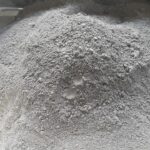Sulfate-Resistant Cement, also known as sulfate-resistant Portland cement, is a type of cement formulated to resist the damaging effects of sulfate ions present in soils or water. Here’s its composition and usage:
Composition:
Sulfate-Resistant Cement is typically manufactured by blending clinker, gypsum, and other materials such as granulated blast furnace slag or fly ash. The clinker used in its production is usually low in tricalcium aluminate (C3A) content, as this compound is particularly susceptible to sulfate attack.
Usage:
- Marine Structures: Sulfate-Resistant Cement is commonly used in the construction of marine structures, such as seawalls, docks, and harbors, where the concrete is exposed to sulfate-rich seawater.
- Sulfate-Rich Soil Conditions: It is also employed in projects where the soil contains high levels of sulfates, which can lead to the deterioration of concrete over time. Examples include foundations for buildings and bridges built in areas with sulfate-rich soils.
- Wastewater Treatment Plants: Sulfate-Resistant Cement finds application in the construction of wastewater treatment plants, where the concrete structures are exposed to sulfate-containing effluents.
- Chemical Processing Facilities: In environments where concrete is exposed to sulfate-rich chemicals, such as in chemical processing plants, sulfate-resistant cement may be preferred to enhance durability.
- Underground Construction: For underground structures such as tunnels and underground utilities, where the risk of sulfate exposure from groundwater is high, sulfate-resistant cement can be used to prolong the service life of the concrete.
Overall, sulfate-resistant cement is essential in environments where sulfate attack poses a significant risk to the durability and performance of concrete structures, providing enhanced resistance and longevity compared to standard Portland cement.

 |
|  |
| 
